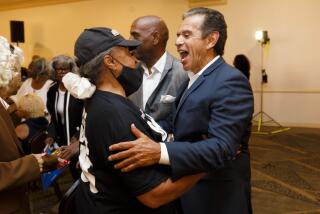Villaraigosa Unveils Plan to Tackle Issues
- Share via
With just over two weeks until election day, Los Angeles mayoral candidate Antonio Villaraigosa announced his plans Sunday for tackling what he sees as the three principal issues for the city: education, crime and traffic.
“The issues that must guide us as we step boldly into this new century are improving public education, making our streets safe, revitalizing our neighborhoods and creating a transportation system that brings us all closer together,” Villaraigosa told about 100 people Sunday evening. “Achieving these goals takes the courage and vision to bring together all of our communities, cultures and neighborhoods as a family--as a group that sometimes squabbles, sometimes struggles, sometimes celebrates, but always sticks together because that’s what families do.”
Villaraigosa’s effort is partly substantive, as he hones his message on three areas that voters and policy makers both have identified as central to Los Angeles’ future. It also, however, is partly tactical: After weeks of reacting to initiatives and charges by City Atty. James K. Hahn, the former assembly speaker is attempting to take the offensive and define the issues that will dominate his campaign’s crucial weeks.
Villaraigosa’s campaign strategists say that Sunday’s speech at a Woodland Hills synagogue was intended to provide direction for the campaign as well as help distinguish the candidate from Hahn. Curiously, however, little of Villaraigosa’s material Sunday was new; instead, most was repackaged from earlier addresses, and a great deal of it involves initiatives and programs also advocated by Hahn.
During his speech at Kol Tikvah, Villaraigosa said if he is elected mayor on June 5 he would:
* Build 100 new schools; require annual audits of the Los Angeles Unified School District; expand after-school programs and support more local control of schools by principals, teachers and parents;
* Hire 1,000 new police officers; expand community policing; create a new program with federal, local and state law enforcement agencies to trace illegal guns; and use nuisance laws to more aggressively close liquor stores and other “crime magnets” that break laws;
* Ban construction and create reversible lanes on major streets during rush hours; install more left-turn signals; add more buses and reduce fares.
After he read from a prepared speech, Villaraigosa stepped off the bema in the temple sanctuary, walked down to the front row of the audience and spoke for about 20 minutes more.
“I’m a consultant’s nightmare,” he said. “But now I want to share with you my heart.”
He used descriptions of his day to explain that no matter where he was, people were energized and enthusiastic about a new leader, about a new Los Angeles.
He was interrupted almost a dozen times with applause from the mostly partisan crowd.
“I believe that hope trumps fear,” he said. “I believe that people want this city to work.”
That rhetoric in part responds to Hahn’s continuing challenge to Villaraigosa’s credentials as a crime fighter. But substantively, Villaraigosa’s program is remarkably similar to Hahn’s. And, despite Villaraigosa’s attempt to take control of the campaign, Hahn is not bound by his rival’s agenda. Hahn’s aides say he will continue to focus on his message of strong, local experience versus Villaraigosa’s six years in the state Legislature.
Additionally, they say Villaraigosa is glossing over the energy crisis--and his role in it--which they say will greatly affect how much money the city receives from Sacramento for such things as schools and transportation. Villaraigosa was one of 120 state legislators who voted for energy deregulation.
“First, he should acknowledge ‘I screwed up here,’ ” said Kam Kuwata, Hahn’s campaign consultant. “He continues to fail to take responsibility for this . . . [but] everything is impacted by the energy crisis.”
The Hahn camp also suggested that Villaraigosa is acknowledging their criticism that he is long on platitudes and short on specifics.
“For fear of hearing a comment like ‘Where’s the beef?’ he’s deciding that he better show where the beef is--better late than never,” Kuwata said. “I welcome it. I’m glad he’s finally discovered that people want to hear about issues.”
Many of Villaraigosa’s proposals mirror the calls made by Mayor Richard Riordan in his final State of the City address 10 days ago. In that speech, the mayor--who has since endorsed Villaraigosa--challenged the candidates to address schools, crime, traffic and other quality-of-life issues.
For his part, Hahn has called for a city-school construction authority to build schools--including 100 new campuses immediately--and he has said he would lobby Washington and Sacramento for money to expand after-school programs. He has also said he would increase the Metropolitan Transportation Authority bus fleet and he proposed a slew of such traffic mitigation efforts as left-turn signals and reversible lanes, among other things. He has called for an increase in the size of the Police Department and promises to address the department’s morale, in part by implementing a work schedule that would allow officers to report for duty just three days a week, 12 hours a day. Hahn has received the endorsement of the Los Angeles police union.
Responding to Villaraigosa’s speech Sunday, Kuwata said: “Does it change our plans? No. We started talking about the issues at the beginning of this year, and we’ll continue to do that.”
More to Read
Sign up for Essential California
The most important California stories and recommendations in your inbox every morning.
You may occasionally receive promotional content from the Los Angeles Times.













